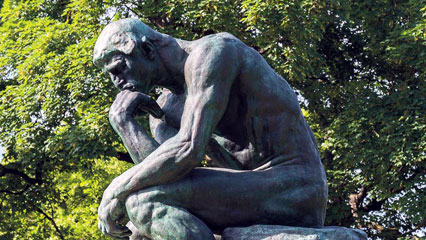
The Final Match
The intellectual fight became an occupation, an attraction, a profession, a duty, something dignified-and eventually knowledge and the striving for the true found their place as a need among other needs. Henceforth not only faith and conviction but also scrutiny, denial, mistrust, and contradiction became a power; all “evil” instincts were subordinated to knowledge, employed in her service, and acquired the splendor of what is permitted, honored, and useful-and eventually even the eye and innocence of the good.
Thus knowledge became a piece of life itself, and hence a continually growing power-until eventually knowledge collided with those primeval basic errors: two lives, two powers, both in the same human being.
A thinker: is now that being in whom the impulse for truth and those life-preserving errors clash for their first fight, after the impulse for truth has proved to be also a life-preserving power.
Compared to the significance of this fight, everything else is a matter of indifference: the ultimate question about the conditions of life has been posed here, and we confront the first attempt to answer this question by experiment. To what extent can truth endure incorporation?
That is the question; that is the experiment.
The Gay Science by Friedrich Nietzsche, trans. by Walter Kaufmann, aphorism 110
Sunday morning is brisk with full sunlight. For me this day is charged as if with static electricity. A news report of several days ago mentioned that the Russians are developing a nuclear-pulse space weapon. When used the weapon is conceived to render useless the satellites in orbit, upon which depend most functions of our society. Functions would include paying for a cup of coffee, an operating electrical grid, direction to military units. The government announced quickly this was nothing that we need worry about. Russia has launched nothing, – yet.
Nukes in space. To use a metaphor, – “my hair stands on end.”
The passage quoted above captured my attention. Nietzsche describes the importance of “truth” as analogous to a death match of sorts, a final “smack-down” between the ancient superstitions, our most deeply rooted beliefs, and that of a historically recent emerging desire for knowledge. Homo sapiens appeared around 190,000 BCE. We began to record our human story around 3200 BCE. For us in the West, critical thought began with the Pre-Socratic thinkers 6th century BCE, Thales, Anaximander, and Anaximenes. Those thinkers searched for that first principle of everything.
That was almost yesterday, by comparison to the expanse of time that passed before. I mean the centuries before critical thought, when the fallback-explanation of everything and life itself were the stories of the god(s). All reality originated by a divine word, and of a beneficent canopy of divine will. Moreover a prospect of redemption for flawed humankind was by means of sacrifice. Sacrifice, – something or somebody has to die, so that others can live. (This is the Christian edition of god-story, and there are many others) In short until 6th century BCE there was no alternative to this hoary, primitive view of things. That was yesterday.
Nietzsche wrote that the struggle between what is true and what is a seductive, time-tested superstition continues. The fight persists existentially, internally within each one of us.
Nothing else matters, nothing so much as this.